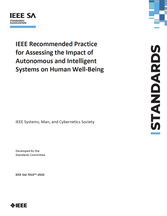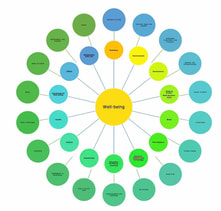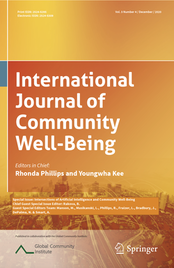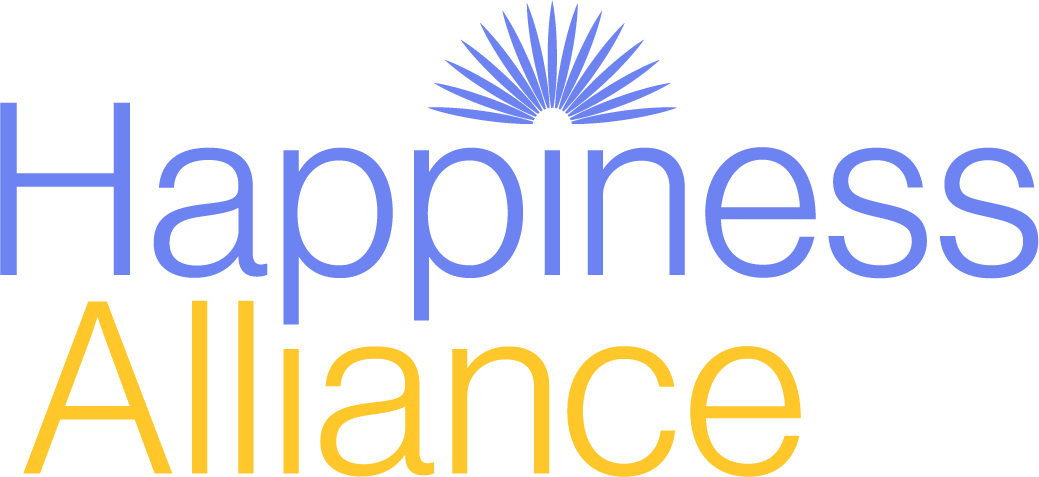We brought Happiness to Artificial Intelligence creators and managers. So can you.
Find the tools, resources and knowledge for AI data engineers, strategists and researchers to contribute to AI that measurable benefits human wellbeing. Partner with us to raise awareness, provide actionable guidance and design new modes of engagement that galvanize researchers, policy makers and industry practitioners to ensure that AI safeguards and contributes to the happiness of people, the wellbeing of communities and the sustainability of our planet's ecosystems.
How we define wellbeing for AI
Well-being is the continuous and sustainable physical, mental, and social flourishing of individuals, communities and populations where their economic needs are cared for within a thriving ecological environment. - IEEE Standard 7010
A new standard for AI.
IEEE 7010 Standard2018-2020, Happiness Alliance's Executive Director Laura Musikanski served as Chair of the Working Group that developed the Institute of Electrical and Electronic Engineers (IEEE) Standard 7010–2020 Recommended Practice for Assessing the Impact of Autonomous and Intelligent Systems on Human Well-being. Happiness Alliance board member Bogdana Rakova played an active role in the Working Group. This standard is the first to present a methodology for designing, providing and managing AI that positively impacts human well-being. Read about it, and see the indicators upon which it is based. |
Access the Standard |
The Standard for Wellbeing & AIIn this article, written by the leadership team that developed IEEE 7010, we begin by articulating the benefits of an approach for AI centered around well-being and the measurement of well-being data. Next, we provide an overview of IEEE 7010, including its key principles and how the standard relates to approaches and perspectives in place in the AI community. Finally, we indicate where future efforts are needed.
READ THE ARTICLE or download directly
| |||||||
A New Field of Study: AI & Community Wellbeing
Our call to connect AI & Community WellbeingRead our article Artificial Intelligence and Community Well-being: A Proposal for an Emerging Area of Research.
In our article, we call for a new area of research on the nexus of community well-being and artificial intelligence (AI). Three components of this research we propose are (1) the development and use of well-being metrics to measure the impacts of AI; (2) the use of community-based approaches in the development of AI; and (3) development of AI interventions to safeguard or improve community well-being.
|
A Special IssueAccess the Special Issue of Springer's International Journal of Community Wellbeing: Intersections of AI & Community Wellbeing.
| ||||||
The Special Issue: Introducing AI to Community Wellbeing Research
Intersections in Artificial Intelligence (AI) and Community Well-being is the Journal of Community Well-being's first Special Issue and the world's first collection of academic articles exploring and defining the impact AI has on community well-being. Articles in the special issue address three topics:
Articles in the issue cover topics of family support and mental health care, urban planning and the Sustainable Development Goals, biomimicry, development contracts and recommender systems, as well as systems theory in the context of the development of AI. The intent of the special issue is to inspire and engage community well-being researchers, the AI community and community organizers in taking a systems-based and transdisciplinary approach to understanding and guiding the impact that AI has on our communities, a subject until now rarely considered. The special issue raises important topics and also demonstrates the width and breadth of learning and research that is needed in this newly identified field of AI and community well-being
- Understanding and measuring the impact of AI on community well-being.
- Engaging communities in the development and deployment of AI and
- The use of AI to enhance or exacerbate community well-being.
Articles in the issue cover topics of family support and mental health care, urban planning and the Sustainable Development Goals, biomimicry, development contracts and recommender systems, as well as systems theory in the context of the development of AI. The intent of the special issue is to inspire and engage community well-being researchers, the AI community and community organizers in taking a systems-based and transdisciplinary approach to understanding and guiding the impact that AI has on our communities, a subject until now rarely considered. The special issue raises important topics and also demonstrates the width and breadth of learning and research that is needed in this newly identified field of AI and community well-being
Introduction - Phillips et aL
| introductiontothespecialissue_phillips.pdf | |
| File Size: | 229 kb |
| File Type: | |
AI's Role in Community Engagement - Havrda
| aisroleincommunityengagement_havrda.pdf | |
| File Size: | 173 kb |
| File Type: | |
A Short Review of IEEE EThically Aligned Design and Standard 7010
| ashortreviewofieeeseadand7010_musikanski.pdf | |
| File Size: | 126 kb |
| File Type: | |
Burend of Informal CAreTakers - Pettini
| burdenofinformalcaregivers_pettini.pdf | |
| File Size: | 552 kb |
| File Type: | |
Aligning AI OptimizATION TO COMMUNITY WELLBEING - STRAY
| aligningaioptimizationtocommunitywb_stray.pdf | |
| File Size: | 515 kb |
| File Type: | |
THE ROLE OF AI IN COMMUNITY PLANNING - HOLLANDER
| |||||||
LEVERAGING DIGITAL INTELLIGENCE - NARAYAN
| leveragingdigitalintelligence_narayan.pdf | |
| File Size: | 880 kb |
| File Type: | |
AN ARGUMENT FOR AN ECOSYSTEMIC AI - BAIO
| anargumentforanecosystemicai_baio.pdf | |
| File Size: | 1020 kb |
| File Type: | |
termination Cultural Misalignment - Ruster
| terminationculturalmisalignment_ruster.pdf | |
| File Size: | 336 kb |
| File Type: | |



